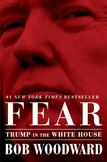Review: Real news about the Trump White House
Readers of Bob Woodward's latest, Fear, can be forgiven if they forget at times that the best-seller is allegedly the result of dogged research and interviews with real, if mostly anonymous people in the actual world. The various confrontations, policy mishaps, personnel missteps and general White House mayhem Fear depicts suggest a work of fiction, but the action in Fear is too over-the-top for the story ever to be credible as mere political satire.
Much has been made of Woodward’s exhaustive methods and the resulting capacity to recreate real-time dialogue and brainstorming sessions behind closed White House doors, but the hot-rod pace and shifting standards for direct quoting (perhaps annoying only to the copy editors out there and the people who love them) can leave readers bereft of emotional and intellectual breath. Fear's jerky dialogue and narrative leaps and starts read like the jumpy shorthand of an agitated psychotherapist during a particularly productive therapy session. Fear is allegedly named for Donald Trump’s “strategy” in business wheeling and dealing, but the title perhaps best describes the only rational response of its exhausted readers after 300-plus pages of this narrative of the White House as a clown car.
Alas, U.S. citizens should be fearful about the state of their national leadership based on Woodward's recreation of the “deliberation” going on in the Trump White House. Mr. Trump seems remarkably oblivious to the innate power and influence of the U.S. presidency and dangerously indifferent to the traditions and expectations of the role. He treats this job as merely the latest addition to a lengthy résumé and a vast opportunity for the Trump family brand. By turns petulant, explosively peevish or nakedly self-serving, abetted or thwarted by the various fawning, foul-mouthed intrigues of his courtiers, the president Woodward describes is a bizarro-world inverse of what the public has come to expect of the role.
The Trump Woodward depicts is not all that different from the cartoon character who shows up each morning to astonish and outrage liberal followers on Twitter.
We learn some interesting things about the current White House, some of which newspaper headlines have already made pretty clear. Staffers in the Trump administration appear not to know too much about history, biology or the French they took—or‚ God forbid‚ foreign policy—but no one seems to let all that ignorance get in the way of preposterous arguments, relentless scheming and backstabbing or the practical matters of government—something else they don't seem to know too much about.
Most of the president's gruesome men and celebrity women make appearances in Fear. Hope Hicks glides through the narrative, her beauty alone enough to kill the beast. The affably bumbling Reince Priebus does his best but fails to keep a lid on anything. Lots of people swear a great deal when they are not scheming to destroy other members of the administration. Mr. Priebus complains that the president has filled his staff and cabinet with hangry predators, not competent rivals. There is a Breslinesque “Can't anybody here play this game?” flavor to 45's White House.
Staff Secretary Rob Porter becomes a cunning counterweight to the general craziness until past unpleasantness catches up‚ a rare occurrence in this White House, where most of the other characters seem impervious to closets overflowing with skeletons, including the president. The dreaded Steve Bannon does not come off too badly in Woodward's tale, dropping f-bombs with abandon and cooly marking time until opportunities present themselves to further his agenda, a white-nationalist Iago with zero regard for Washington niceties, democratic traditions or the damage he might be doing to vulnerable people.
In this White House, the best indeed lack any conviction and influence‚ while the worst are full of persuasive intensity.
Churlish, short-sighted, selfish, the Trump Woodward depicts is not all that different from the cartoon character who shows up each morning to astonish and outrage liberal followers on Twitter. In Fear, Trump as an actual human being makes a few rare appearances—for example, in contemplating a response to the Syrian regime’s chemical attacks. He seems genuinely appalled by the Syrian dictator, but there is no follow-through or deliberation or doubt before or after any of his major decisions, even as they contradict themselves. In this White House, the best indeed lack any conviction and influence‚ while the worst are full of persuasive intensity.
Trump is all id. The day-care staff swirling around him at the White House have become expert at Trumpian impulse control, from pacifying flattery and bureaucratic obfuscation to outright deception. Many take to simply hiding material from the president to prevent jaw-dropping policy blunders. (Spoiler alert: He finds ways to make them anyway.)
All in all, Fear is a sorry and depressing read. If Woodward's account turns out to be an example of the president's beloved fake news, we can only be relieved.
This article also appeared in print, under the headline “Real News,” in the November 26, 2018, issue.











